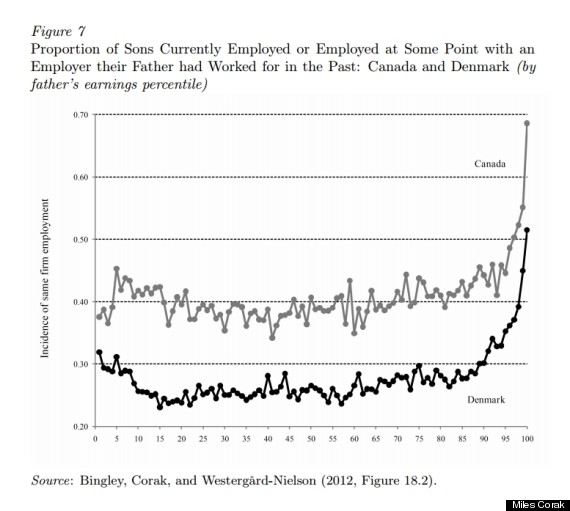We’ve all heard stories of nepotism in the workplace — people rising
through the ranks thanks to a helping hand from an influential relative.
Now a research paper from University of Ottawa economist Miles Corak shows how nepotism helps the wealthiest people in society retain their riches.
Corak’s study found that the higher up the income ladder you go, the likelier a son is to work for the same company as his father.
This chart from Corak’s paper, comparing Canada and Denmark, shows how in both countries there is a spike in the number of sons working for the same employer as the father at the very top end of the income ladder.

Corak suggests the rich have a lot of motivation to help their kids into the family business.
“Sons of top earning fathers are more likely to fall from the top strata if they did not work for the very same employer for which their father had also worked,” the study says.
In other words, giving your kid a job at your company is one way of making sure your family stays rich.
Corak notes that, despite this phenomenon, Canada enjoys a high level of income mobility. That is, it’s relatively easy to get richer (or poorer) in Canada, especially compared to the U.S.
Along with Sweden, Canada is one of very few countries where “high mobility for most coexists with a ‘dynasty’ for the top one per cent,” Corak writes.
Simply put, the game is rigged for Canada’s richest, but the rest of us still have a chance at improving our lot in life.
But how much of a chance is it, really? Corak’s research includes a warning: The rising income inequality of recent years is making those family connections more important than they used to be, with our “own hard work playing a commensurately weaker role.”
Original Article
Source: huffingtonpost.ca
Author: Daniel Tencer
Now a research paper from University of Ottawa economist Miles Corak shows how nepotism helps the wealthiest people in society retain their riches.
Corak’s study found that the higher up the income ladder you go, the likelier a son is to work for the same company as his father.
This chart from Corak’s paper, comparing Canada and Denmark, shows how in both countries there is a spike in the number of sons working for the same employer as the father at the very top end of the income ladder.

Corak suggests the rich have a lot of motivation to help their kids into the family business.
“Sons of top earning fathers are more likely to fall from the top strata if they did not work for the very same employer for which their father had also worked,” the study says.
In other words, giving your kid a job at your company is one way of making sure your family stays rich.
Corak notes that, despite this phenomenon, Canada enjoys a high level of income mobility. That is, it’s relatively easy to get richer (or poorer) in Canada, especially compared to the U.S.
Along with Sweden, Canada is one of very few countries where “high mobility for most coexists with a ‘dynasty’ for the top one per cent,” Corak writes.
Simply put, the game is rigged for Canada’s richest, but the rest of us still have a chance at improving our lot in life.
But how much of a chance is it, really? Corak’s research includes a warning: The rising income inequality of recent years is making those family connections more important than they used to be, with our “own hard work playing a commensurately weaker role.”
Original Article
Source: huffingtonpost.ca
Author: Daniel Tencer

No comments:
Post a Comment